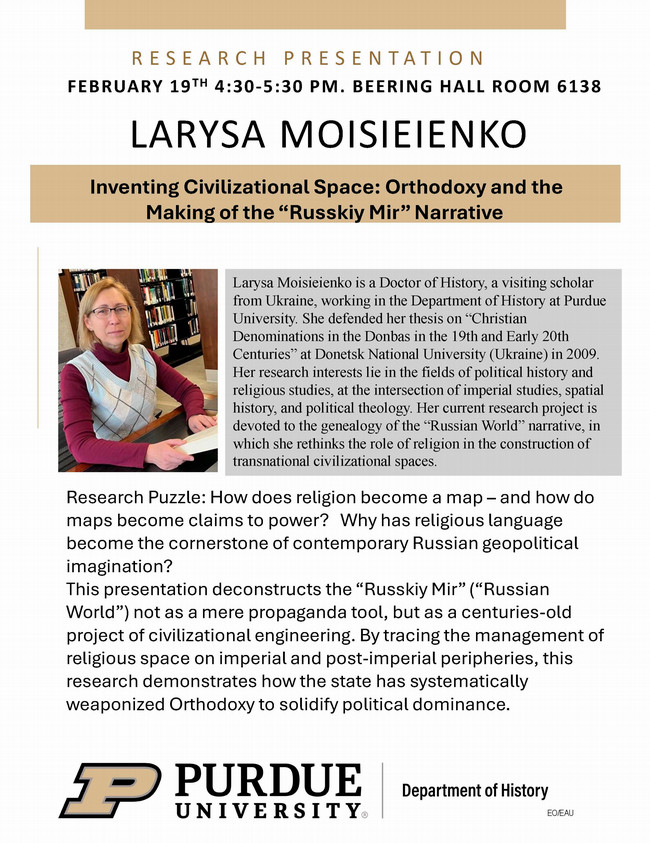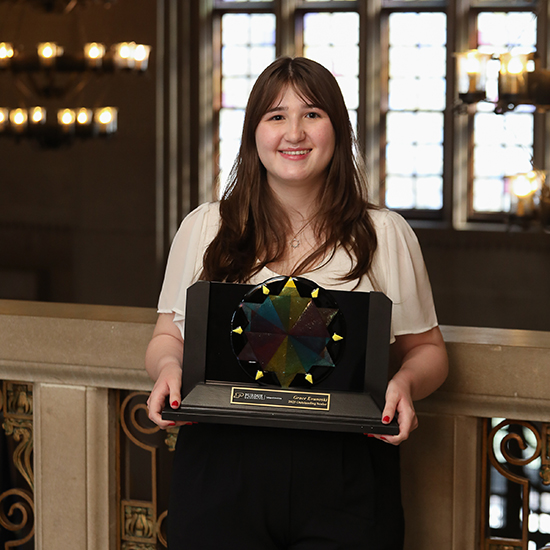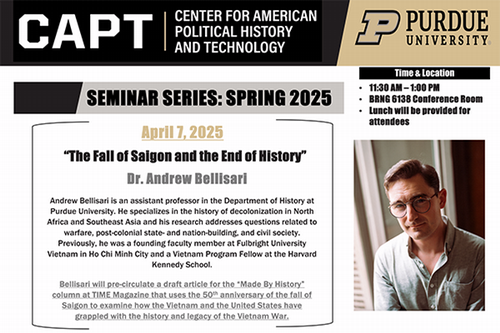
Recent History Department Events
This page highlights some of our previous events in the Department of History. To see our upcoming events, please visit this page.
Recent Events
CORNERSTONE INTEGRATED LIBERAL ARTS
February 26, 2026
4:00 PM
STEW 202
Please join for a presentation by Dr. Jonathan Zimmerman entitled "The Missing Piece: College Teaching and the Fate of Higher Education"
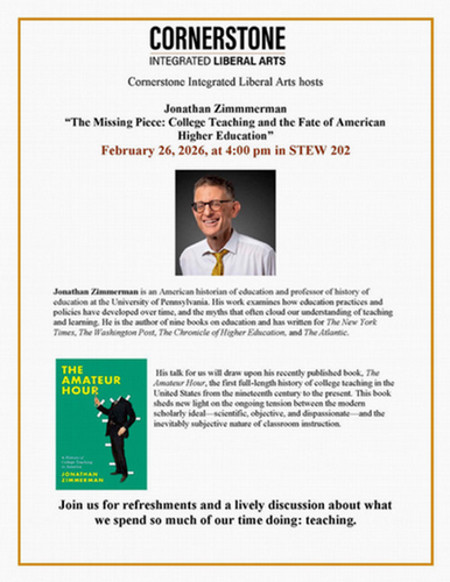
HUMAN RIGHTS PROGRAM PRESENTS THE HUMAN RIGHTS LAB
Monday, February 23
11:30-12:20
WALC 3090
Dr. Ronald J. Stephens will present "Decentering Harlem and the Atlantic: The Diaspora of the Midwest - An Inland Framework for Rethinking the African Diaspora."
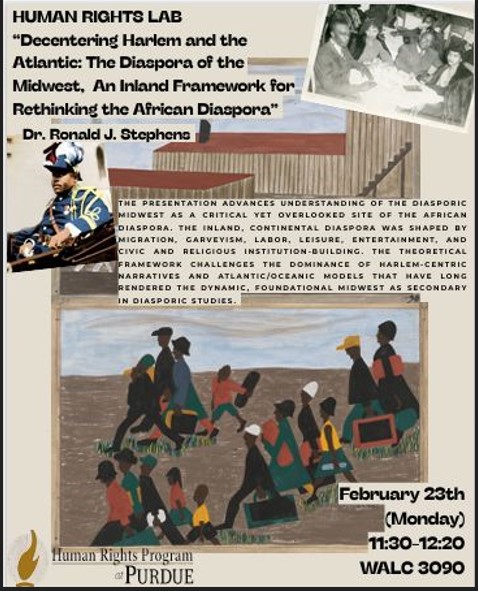
CAPT Seminar Series
CENTER FOR AMERICAN POLITICAL HISTORY, MEDIA, AND TECHNOLOGY
February 16, 2026
11:30-1:00
BRNG 6138
Please join for a presentation by Dr. Lily Geismer entitled "Democrats and Big Tech: Past, Present, and Future"
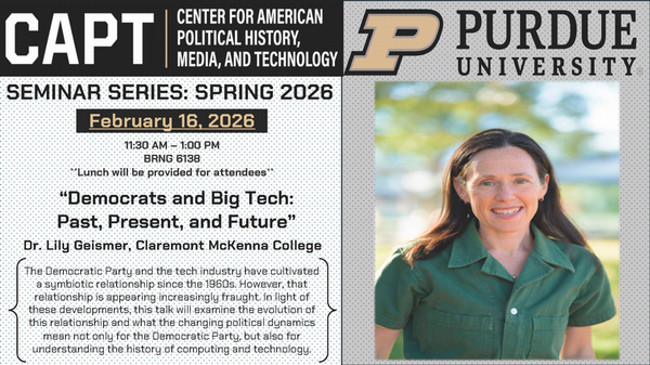
CAPT Seminar Series
CENTER FOR AMERICAN POLITICAL HISTORY, MEDIA, AND TECHNOLOGY
January 26, 2026
11:30 AM - 1:00 PM
BRNG 6138
Please join for a presentation by Dr. Bruce J. Schulman entitled "The Science of Citizenship: Ralph Nader and the Mugwump Tradition in Modern American History".
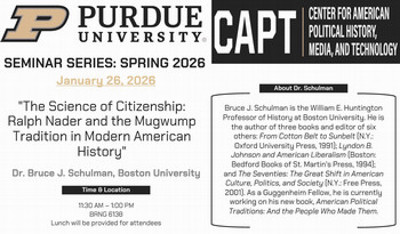
CAPT Seminar Series
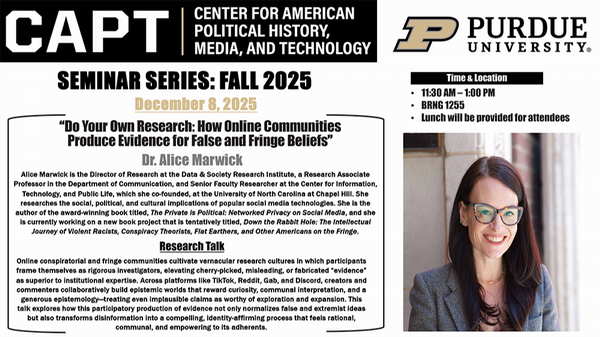
Dr. Alice Marwick, the director of research at Data & Society Research Institute, will share her new research project “Do Your Own Research: How Online Communities Produce Evidence for False and Fringe Beliefs,” on Monday, December 8, 2025 at 11:30 in BRNG 1255. (Please note the date change from earlier announcements and the different room!)
Dr. Marwick is also a research associate professor in the Department of Communication at University of North Carolina at Chapel Hill and a senior faculty research at the university’s Center for Information, Technology, and Public Life, which she co-founded.
She is the author of the award-winning book titled, The Private is Political: Networked Privacy on Social Media. This talk will draw on research from her current manuscript in progress, “Down the Rabbit Hole: The Intellectual Journey of Violent Racists, Conspiracy Theorists, Flat Earthers, and Other Americans on the Fringe.”
Lunch will start at 11:30 a.m. and then a research talk will begin shortly after. There is no pre-circulated material as Dr. Marwick will deliver a short research talk about her work in progress and then we will open it up to a discussion and conversation.Monthly Human Rights Roundtable
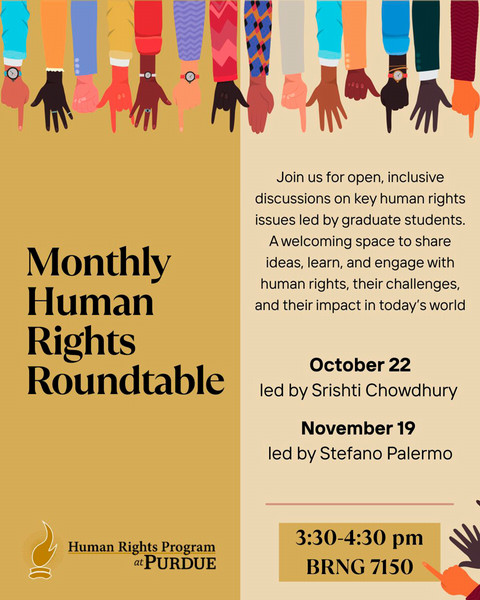
Join the Human Rights Program at Purdue for the Monthly Human Rights Roundtable in BRNG 7150, from 3:30-4:30 p.m. The November 19 speaker will be Stefano Palermo, a graduate student in the Department of History.
The Human Rights Roundtable is a gathering for open, inclusive discussions on key human rights issues led by graduate students. It is a welcoming space to share ideas, learn, and engage with human rights, their challenges, and their impact in today's world.
The Human Rights Roundtable takes place monthly on Wednesdays, from 3:30 to 4:30 p.m. in BRNG 7150. The meetings are coordinated by graduate students pursuing the Graduate Concentration in Human Rights.
CAPT Seminar Series
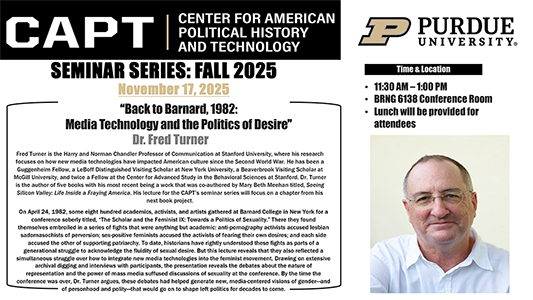
Dr. Fred Turner is the Harry and Norman Chandler Professor of Communication at Stanford University, where his research focuses on how new media technologies have impacted American culture since the Second World War. He has been a Guggenheim Fellow, a LeBoff Distinguished Visiting Scholar at New York University, a Beaverbrook Visiting Scholar at McGill University, and twice a Fellow at the Center for Advanced Study in the Behavioral Sciences at Stanford. Dr. Turner is the author of five books with his most recent being a work that was co-authored by Mary Beth Meehan titled, Seeing Silicon Valley: Life Inside a Fraying America. His lecture for the CAPT’s seminar series will focus on a chapter from his next book project.
On April 24, 1982, some eight hundred academics, activists, and artists gathered at Barnard College in New York for a conference soberly titled, “The Scholar and the Feminist IX: Towards a Politics of Sexuality.” There they found themselves embroiled in a series of fights that were anything but academic: anti-pornography activists accused lesbian sadomasochists of perversion; sex-positive feminists accused the activists of fearing their own desires; and each side accused the other of supporting patriarchy. To date, historians have rightly understood these fights as parts of a generational struggle to acknowledge the fluidity of sexual desire. But this lecture reveals that they also reflected a simultaneous struggle over how to integrate new media technologies into the feminist movement. Drawing on extensive archival digging and interviews with participants, the presentation reveals the debates about the nature of representation and the power of mass media suffused discussions of sexuality at the conference. By the time the conference was over, Dr. Turner argues, these debates had helped generate new, media-centered visions of gender—and of personhood and polity—that would go on to shape left politics for decades to come.
Purdue Human Rights Program
Anna Hájková, author of People Without History are Dust: Queer Desire and the Holocaust (Toronto University Press, 2025)
November 11, 2025 at 5:00 PM
West Lafayette Public Library, 208 W. Columbia St.
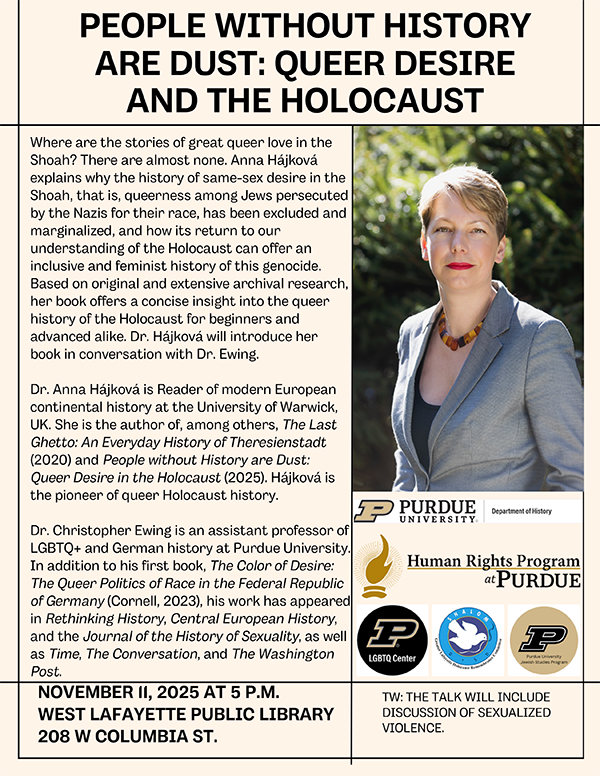
The Human Rights Program at Purdue, in co-sponsorship with the GLHRC, the LGBTQ Center, the Department of History, and the Jewish Studies Program (aka: “The Big Five”) are thrilled to present, in a little less than two weeks, Professor Anna Hájková (History, Warwick, UK), who will be speaking to us about her newly published book People Without History are Dust: Queer Desire and the Holocaust (Toronto UP, 2025) in conversation with Professor Christopher Ewing (HIST) at 5pm on November 11, 2025 at the West Lafayette Public Library.
Prof. Hájková’s work stands at the forefront of queer Holocaust history, a story which has been excluded and marginalized. She argues that bringing this history into focus can offer an inclusive and feminist history of this genocide. Based on on original and extensive archival research, her book offers a consice insight into the queer history of the Holocaust for beginners and advanced alike.
Path of the Exile
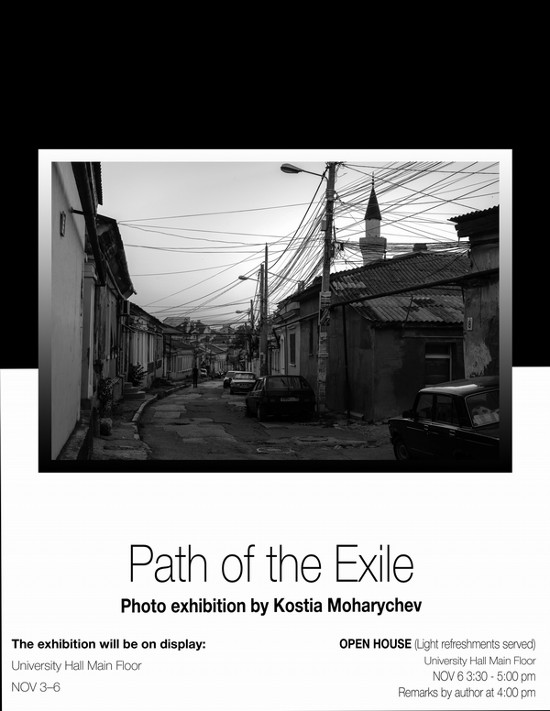
Department of History Visiting Scholar Kostia Moharychev presents an exhibition, "Path of the Exile."
The exhibition will feature an Open House (light refreshments served) on Thursday, November 6 from 3:30-5:00 p.m. in University Hall, Main Floor. Kostia will give remarks at 4:00 p.m. The exhibit will be on display in University Hall, Main Floor, from November 3 through November 6.
CAPT Virtual Event: Book Discussion
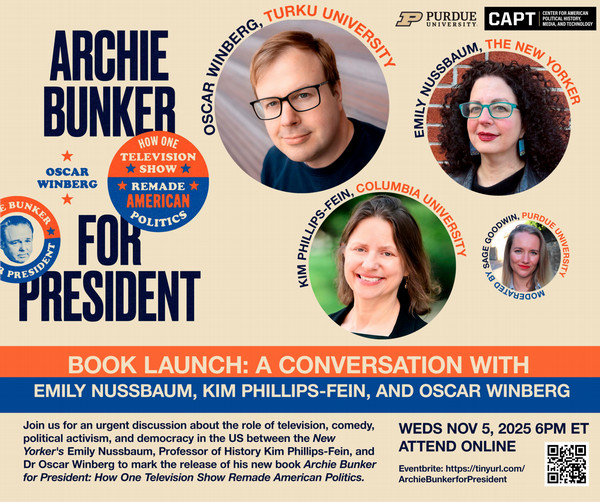
CAPT is thrilled to invite you to a virtual event on Wednesday, November 5 at 6PM to discuss the new book, Archie Bunker for President: How One Television Show Remade American Politics, with author Oscar Winberg, the New Yorker television critic Emily Nussbaum, and esteemed political historian from Columbia University, Kim Phillips-Fein. Sage Goodwin will moderate a very timely conversation about political satire, television entertainment, and the shifting political landscape in the 1970s, with attention to the consequences for today. See attached for a flyer with more details.
History in the Stacks
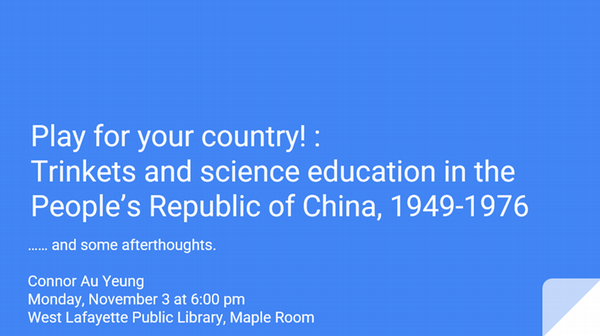
Announcing a new History Graduate Student Association (HGSA) event: History in the Stacks. Similar to History on Tap, History in the Stacks is an event that allows graduate students to present fun historical topics in a public-facing setting.
On Monday, November 3 at 6:00 p.m. in the West Lafayette Public Library's Maple Room, Connor Au Yeung will deliver his presentation titled "Play for your Country! Trinkets and science education in the People's Republic of China, 1949-1976 ... and some afterthoughts."Purdue Human Rights Program
Presented as part of the Purdue Human Rights Program
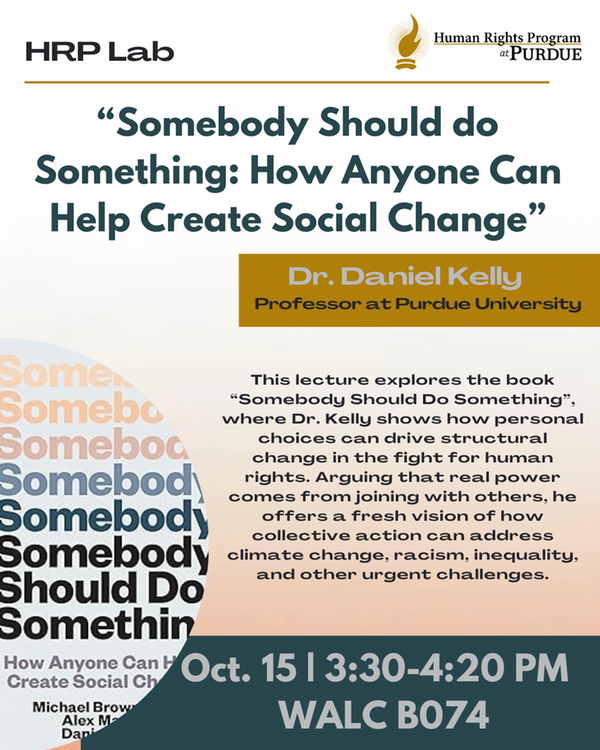
Mahzarin R. Banaji (Harvard) calls the book, “perfectly poised to meet the moment…a gem containing hope.” In his talk, Dr. Kelly will show how personal choices can drive structural change in the fight for human rights. He argues that real power comes from joining with others and offers a fresh vision of how collective action can address climate change, racism, inequality, and other urgent universal challenges across the board.
CAPT Seminar Series
Dr. Sage Goodwin and Dr. Hanna Sistek
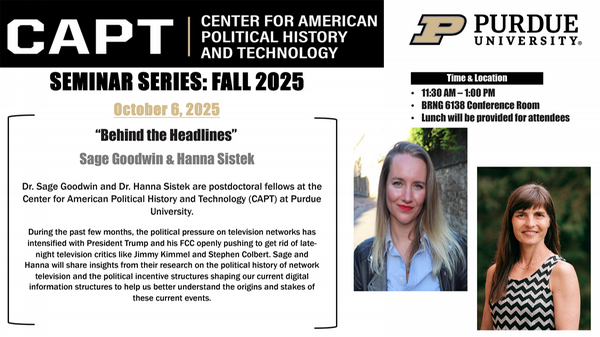
Dr. Sage Goodwin and Dr. Hanna Sistek are postdoctoral fellows at the Center for American Political History and Technology (CAPT) at Purdue University.
During the past few months, the political pressure on television networks has intensified with President Trump and his FCC openly pushing to get rid of late-night television critics like Jimmy Kimmel and Stephen Colbert. Sage and Hanna will share insights from their research on the political history of network television and the political incentive structures shaping our current digital information structures to help us better understand the origins and stakes of these current events.HISTORY ON TAP
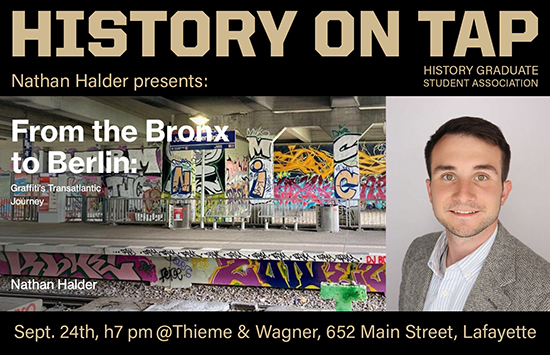
A Constitution Week Discussion
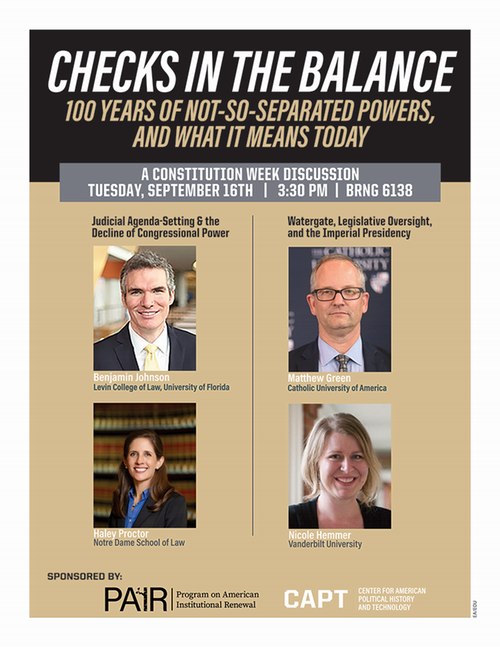
We will start on September 16 at 3:30 in BRNG 6138 with a discussion about the role of the judiciary in setting the legislative agenda with two legal scholars, Benjamin Johnson (University of Florida) and Haley Proctor (Notre Dame). After a brief break, we will have a very important conversation with Matt Green (Catholic University of America) and Nicole Hemmer (who is staying an extra day after her CAPT seminar on Monday) about the post-Watergate efforts to reign in the imperial presidency, why they failed, and what might be solutions today.
Hosted by CAPT and the Program in American Institutional Renewal (PAIR).
CAPT SEMINAR SERIES
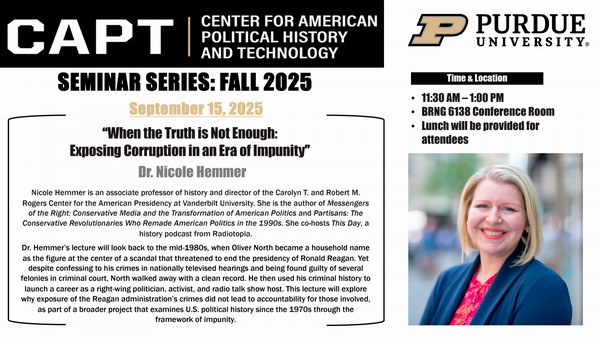
2025 College of Liberal Arts Outstanding Senior Awards
Department of History graduating senior Grace Evanoski (above) was recently presented with the 2025 College of Liberal Arts Outstanding Senior Award. The Awards event was held in the East & West Lounges at the Purdue Memorial Union on April 11, 2025. Congratulations, Grace!
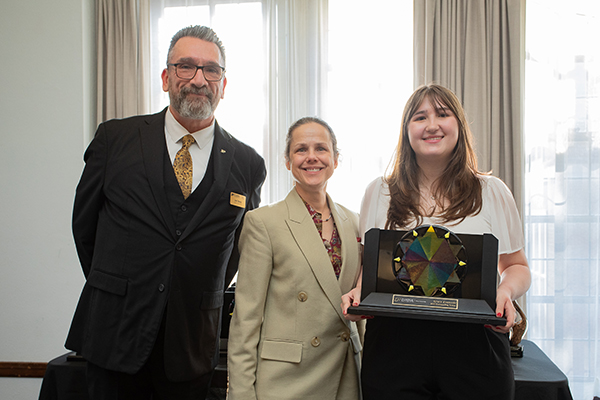
Grace Evanoski (right), pictured with Executive Associate Dean Joel Ebarb and Department of History Director of Undergraduate Studies Yvonne Pitts.
See all of the CLA Outstanding Seniors at this link.
History on Tap
April 29, 2025
Thieme and Wagner Brewery
652 Main St, Lafayette, IN 47901
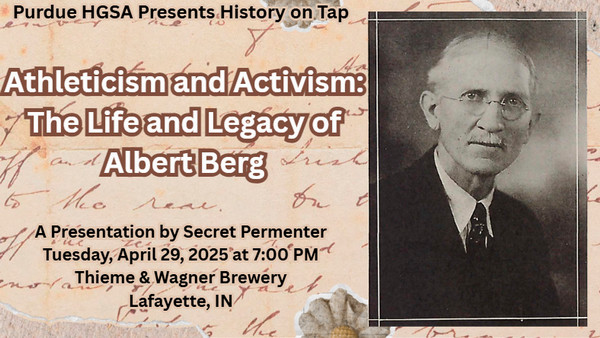
The History on Tap event for April will be held at Thieme and Wagner Brewery on Tuesday, April 29th, at 7:00 PM. This is the final History on Tap of the semester.
Secret Permenter, a first year PhD student, will deliver a presentation titled "Athleticism and Activism: The Life and Legacy of Albert Berg."
History Honors Forum
April 22, 2025
LWSN 1142
5:00-7:00 PM
The culminating event in the History Honors Program is the annual Forum held every April. At the Forum, Honors students present their original research to an audience of faculty, family and friends, and other guests.
Join us at the 2025 History Honors Forum. The event is free and open to the public. You can download the event flyer at this link. The following students will be giving presentations:
Elijah Ahrens
“Buccaneers and Slavery: Port Royal and Piracy Acting as a Space of Freedom”
Becka Bash
“The Church Committee: How the CIA responded to Congressional Investigation in the Post-Watergate Era”
Jael Brown
“Global Perception and Interpretation of the 1876-1878 Bulgarian Independence Movement”
Jiahui Chen
“Interpreting Hitler: Nazism Perceived by British Union of Fascists, 1932-1939”
Allyson Dinwiddie
“The Role of 12th Century Greek Voices in Legitimizing Norman Sicilian Kingship”
Grace Evanoski
“Natural Life vs. Legal Life: An Examination of Abortion & Perceptions of Life in the Womb in the Nineteenth Century”
Elizabeth Lazar
“Dancing Towards Demise: Working-Class Leisure and Middle-Class Reform in Early 20th Century American Dance Halls”
Michael Strunk
“Cum Terraemotus Essent: Holy Men and the Development of Imperial Earthquake Response”
Johari Tello
“Resistance and Influence: Black Eugenics and Public Health Education in the Early to Mid-20th”
Nah'Shon Williams
“Echoes of Resilience: The Evolution of Soul and R&B as Social Consciousness during the Civil Rights and Black Power Eras”
CAPT Seminar Series
Dr. Andrew Bellisari is an assistant professor in the Department of History at Purdue University. He specializes in the history of decolonization in North Africa and Southeast Asia and his research addresses questions related to warfare, post-colonial state- and nation-building, and civil society. Previously, he was a founding faculty member at Fulbright University Vietnam in Ho Chi Minh City and a Vietnam Program Fellow at the Harvard Kennedy School.
Purdue Human Rights Program
Via Zoom
3:00-4:15 PM
Dr. Chielo Eze
Presented as part of the Purdue Human Rights Program
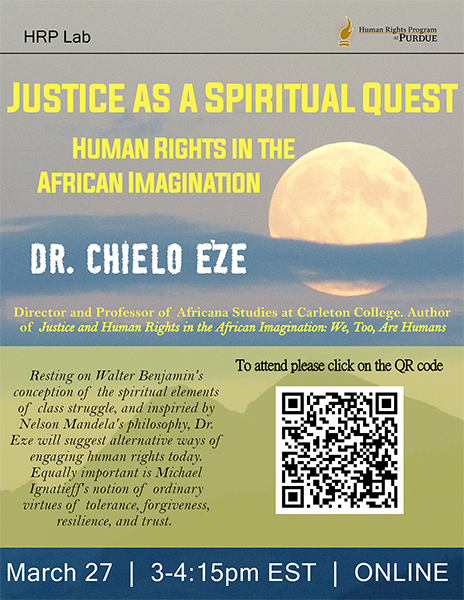
The Human Rights Lab welcomes Dr. Chielo Eze (PhD from Purdue University; MFA). Dr. Eze will present, “Justice as a Spiritual Quest: Human Rights in the African Imagination” on Thursday , March 27th, at 3pm on Zoom.
Dr. Eze is Director and Professor of Africana Studies at Carleton College, author of Justice and Human Rights in the African Imagination: We, Too, Are Humans.
About the talk: Resting on Walter Benjamin’s conception of the spiritual elements of class struggle, and inspired by Nelson Mandela’s philosophy, Dr. Eze will suggest alternative ways of engaging human rights today. Equally important is Michael Ignatieff’s notion of ordinary virtues of tolerance, forgiveness, resilience, and trust.
History on Tap
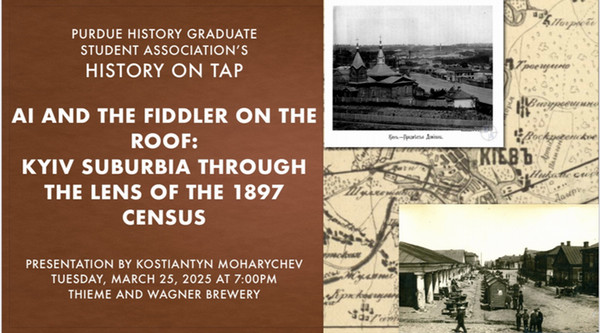
10th Biennial Purdue History Graduate Student Association Conference
at Purdue University in West Lafayette
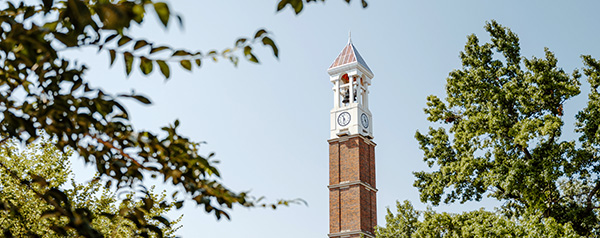
This conference is open to interested attendees, with content focused on topics of interest to graduate students and history majors, including those in the undergraduate History Honors program. Graduate students from universities outside of Purdue are welcome to attend!
Learn more and register for the 2025 HGSA Conference at this link.
Download the complete Conference Schedule as a PDF.
Guest Speaker: Too Black
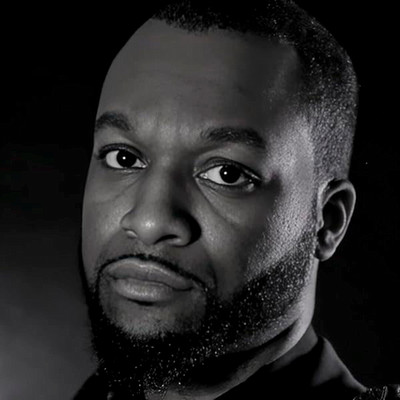
What does it mean to conquer a people and then call said conquest a society? How does a fabricated society built upon conquest legitimise its actions? It must launder as a means to make its “grimey” activity appear clean. When opposition inevitably arises within the conquered, their rage must be subsumed by the State to further clean the oppression. Laundering Black Rage chronicles the rise of the capitalist State while examining the historical dillution of Black Rage. It demonstrates how the maintenance of capitalism increasingly requires the manufactured consent of the conquered.
Much has been made in international headlines about scandals of high-profile Black Lives Matter leaders following the George Floyd protests but what if the scandals were just gross expressions of a much more ingrained process of counterinsurgency? How was the contagious Black Rage provoked by the police officer's knee on a poor Black man's neck converted into a benign commodity that could be massively marketed by Disney? How does the Black Rage embroiled in the global south become justification for death making sanctions and regime change? Laundering Black Rage reaches behind the front to trace the criminal origins.
The spaces we occupy, the cities we breathe all bribe us with a lifestyle that compels us to carry on the laundering of conquest. For many, survival is dependent upon it. By examining how the state-fabricated formations of labour (race, class, gender) remain organised even when the conquered populations are clearly enraged, we hope to arrive at an analysis to help reverse the process.
Too Black is a poet, scholar, organizer and filmmaker who blends critical analysis with biting sarcasm. He has headlined various stages and events including the historic Nuyorican Poets Café in New York City, Princeton University, and Johannesburg Theater in South Africa. His words have been published in online publications such as Black Agenda Report, Left Voice, Hammer and Hope and Hood Communist. He is currently the host of the Black Myths Podcast, a podcast debunking the BS said about Black people. Lastly, he the co-director of the award-winning documentary film The Pendleton 2: They Stood Up.
Download the event flyer at this link.
Guest Speaker: Dr. Holly A. Crocker
February 26, 2025
4:30 PM, WALC 2051

Feminist Subjectivity, Women's Mastery, and Chaucer's Wife of Bath
Join us for snacks and a lecture with Dr. Holly A. Crocker, Carolina Distinguished Professor of English at the University of South Carolina. Series supported by: Department of English, Department of History, School of Languages and Cultures, School of Interdisciplinary Studies, and Purdue Libraries.
Download the event flyer at this link.
History on Tap
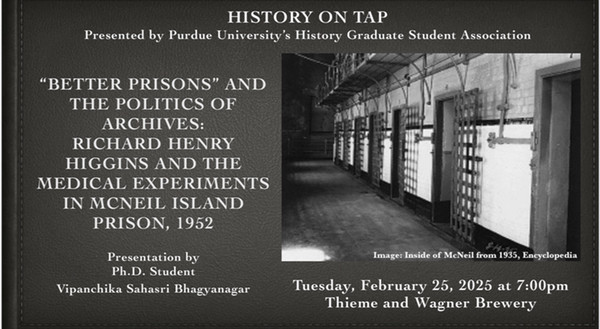
Fighting for Freedom Within the U.S. Army
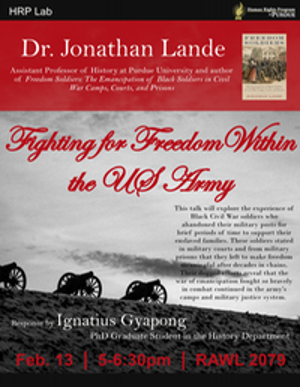
Learning to Code: From Information Theory to French Theory (2023)
Time: 5:30 - 7:00 PM
Krannert Auditorium, Room 140
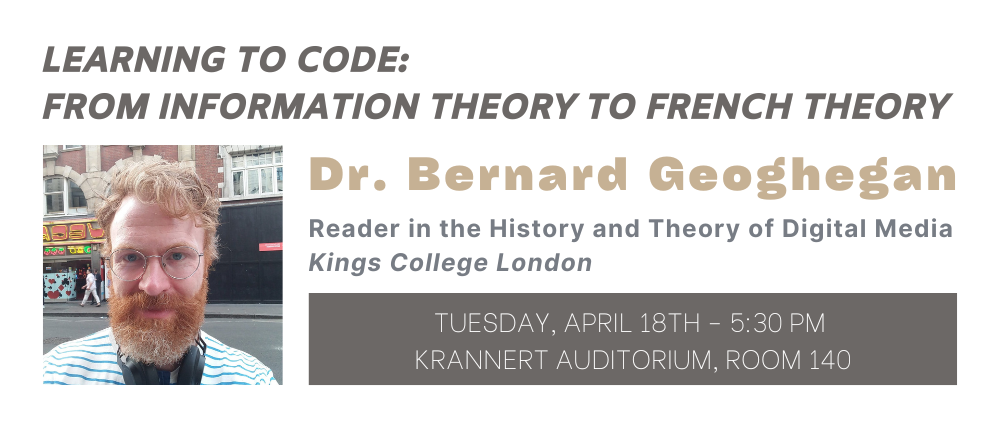
American Political History Conference (2022)
The Past, Present, and Future of American Democracy
At a moment when democracy is under assault in the U.S. and abroad, and when grassroots activism is rapidly and radically altering the terms of political debate, U.S. political history has been thriving, both inside the academy and in the wider world of activism, journalism, and politics. This conference aimed to bring together cutting-edge scholarship with new forms of public engagement to use historical research and thinking to understand and address twenty-first century political challenges. This event brought political historians into conversation with one another and the broader public and grapple with the idea of what it means to study American political history. It created opportunities to build networks, share new research, debate ideas, think about the implications of this research in our contemporary setting, and discuss strategies for public engagement. This conference aimed to encourage expansive reassessments of the parameters of American political history and the ways in which we disseminate historical scholarship within and outside the academy.
This conference was held in person, but there were options to participate virtually, including a Saturday Keynote Lunch Conversation on “Reproductive Rights and Politics,” with Gillian Frank, Jennifer Holland, Amrita Chakrabarti Myers, and Mary Ziegler.
A copy of the program can be found here.
Women in the White House (2018)
Former First Lady Laura Bush and daughters Barbara and Jenna visited Purdue University's Elliott Hall of Music on Oct. 18, 2018 for the Sears Lecture Series event, "Women in the White House and Beyond." The Bush women discussed life in politics and their advocacy since President George W. Bush left the White House with associate professor of history Kathryn Brownell. Presented by College of Liberal Arts and Department of History.
